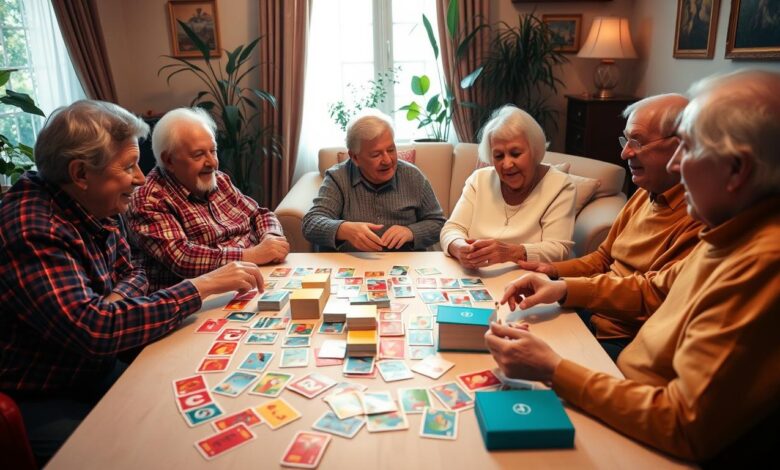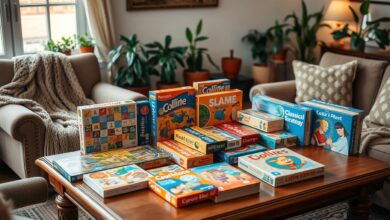Engaging Memory Games for Seniors: Fun Activities

Physical activity and regular exercise are well-known ways to aid in living a long and healthy life. Similarly, exercising our brains can greatly help in preserving memory and fighting cognitive decline. Engaging memory games for seniors can be an excellent way to exercise their minds in multiple ways. These games not only serve as fun social activities but also provide the brain with the necessary exercise to maintain mental sharpness. This article will explore a variety of engaging memory games and brain-boosting activities designed to keep seniors mentally sharp and socially engaged.
Key Takeaways
- Memory games can boost socialization skills, which is crucial for seniors in senior living communities.
- Sudoku puzzles and Wii Sports can improve cognitive skills and memory retention in the elderly.
- Jigsaw puzzles enhance problem-solving abilities and concentration, contributing to brain health.
- Bingo and Simon Says promote social interaction and address memory issues in seniors.
- Switching up daily tasks with the non-dominant hand can strengthen neural pathways and improve overall brain function.
The Benefits of Engaging Memory Games for Seniors
Engaging in memory games and brain exercises can provide a wealth of cognitive benefits for seniors. These activities not only improve memory and information retention but also boost overall brain health and function.
Boost Cognitive Skills and Brain Health
Memory games challenge seniors to think critically, problem-solve, and improve their attention to detail. These mental exercises can help maintain and even enhance cognitive abilities, slowing the progression of age-related memory issues. Research indicates that seniors who regularly engage in cognitive activities are less likely to experience mental decline, and in some cases, they can even reverse signs of cognitive aging.
Improve Memory and Information Retention
Brain exercises like crossword puzzles, Sudoku, and matching games can strengthen neural pathways, making it easier for seniors to store and access information. A study in the ‘Journal of the American Geriatrics Society’ found that older adults who participated in brain training activities demonstrated improved memory, quicker information processing, and better problem-solving skills compared to those who did not engage in such activities.
Enhance Socialization and Combat Isolation
Many memory games, such as Bingo, board games, and trivia challenges, can be enjoyed in a group setting. This social interaction not only provides a fun and engaging environment but also helps combat the feelings of isolation that can often accompany aging. Engaging in these interactive games can improve seniors’ communication skills, boost their mood, and foster a sense of community.
By incorporating a variety of memory games and brain exercises into their daily routine, seniors can reap the cognitive benefits of memory games for seniors, mental health advantages of brain exercises for elderly, and social impact of interactive games for older adults. These engaging activities can help maintain brain health, improve memory, and foster meaningful social connections.
Classic Memory Games for the Elderly
Engaging the mind through classic memory games can be a fantastic way for seniors to exercise their cognitive abilities, enhance social interactions, and maintain a healthy brain. Two popular and timeless memory games that offer these benefits are Simon Says and the Matching Game.

Simon Says: A Social Game for Cognitive Function
Simon Says is a beloved game that can be played with a group or one-on-one, making it an excellent choice for social brain games for the elderly. This classic game not only promotes cognitive function but also encourages social interaction and communication. As players follow the leader’s instructions, they must remember the sequence of commands, exercise their memory, and stay focused – all while enjoying quality time with friends or family.
The Matching Game: Exercise Motor Skills and Memory
The matching game, also known as the memory card game, is one of the simplest yet most effective classic memory games for seniors. Players must flip over cards and try to find matching pairs, exercising both their motor skills and memory abilities. This engaging activity helps older adults improve hand-eye coordination, enhance short-term memory, and experience the satisfaction of problem-solving – all while providing a fun social experience.
These timeless memory games offer a blend of cognitive stimulation, social engagement, and pure enjoyment for seniors. By incorporating classic memory games into their daily routines, older adults can boost their brain health, strengthen interpersonal connections, and maintain their mental agility.
Stimulating Activities for Mental Agility
As we age, maintaining mental agility becomes increasingly crucial. One engaging way for seniors to exercise their cognitive abilities is by switching up everyday tasks and using their non-dominant hand or foot. This simple yet effective brain exercise can help build neural pathways and improve overall brain function.
Switch It Up: Use Non-Dominant Hand for Neural Pathways
Trying to perform daily activities like brushing teeth, eating, or opening doors with your non-dominant hand may feel awkward at first, but it can have significant benefits for seniors. By challenging the brain to adapt to these unfamiliar movements, you’re stimulating neural pathways and enhancing cognitive flexibility. This type of brain exercise to improve mental agility for seniors can help boost memory, problem-solving skills, and overall brain health.
Incorporating using non-dominant hand activities for elderly into your daily routine is a simple and effective way to neural pathway stimulation for older adults. It’s an easy way to keep your mind sharp and engaged, all while maintaining your independence and confidence.
“Challenging the brain to adapt to unfamiliar movements can have significant benefits for seniors, helping to boost memory, problem-solving skills, and overall brain health.”
Jigsaw Puzzles: Concentration and Problem-Solving
For seniors seeking engaging mental exercises, jigsaw puzzles offer a delightful way to strengthen cognitive function. These classic problem-solving activities challenge older adults to exercise their concentration, visual-spatial skills, and problem-solving abilities. The more intricate the puzzle, the greater the cognitive workout for seniors.
Completing jigsaw puzzles requires meticulous focus and strategic thinking as seniors piece together the various shapes and colors. This process helps seniors sharpen their memory, attention, and hand-eye coordination. Additionally, the sense of achievement felt when finishing a puzzle can boost seniors’ self-confidence and provide a mood-lifting activity.
- Jigsaw puzzles activate multiple cognitive abilities, including perception, mental rotation, working memory, and reasoning.
- Assembling puzzles with more pieces demands greater concentration and problem-solving skills from seniors.
- Puzzle-solving can improve dexterity and fine motor skills in the fingers and hands of older adults.
- The rewarding feeling of completing a puzzle can enhance seniors’ mood and self-esteem.
Whether seniors opt for traditional paper puzzles or digital versions on tablets, jigsaw puzzles present an engaging way to exercise the brain and keep the mind sharp. As a versatile cognitive workout, jigsaw puzzles are a valuable addition to any senior’s mental fitness regimen.

“Jigsaw puzzles are like a workout for your brain, helping seniors stay mentally fit and focused.”
| Cognitive Benefits of Jigsaw Puzzles | How Puzzles Help Seniors |
|---|---|
| Improved problem-solving skills | Enhance concentration and focus |
| Enhanced visual-spatial reasoning | Boost memory and recall |
| Increased mental flexibility | Strengthen hand-eye coordination |
| Sharpened attention and focus | Provide a sense of accomplishment |
The Power of Music Therapy
Music has a remarkable ability to evoke memories, emotions, and connections, making it a powerful therapeutic tool for seniors, particularly those living with Alzheimer’s disease or other forms of dementia. Numerous studies have shown the incredible benefits of music therapy for preserving musical memories and reducing the risk of dementia.
Preserve Musical Memories in Alzheimer’s Disease
Individuals with Alzheimer’s disease often experience a remarkable preservation of their musical memories, even as other cognitive functions decline. The Mayo Clinic states that “musical memories are often preserved in Alzheimer’s disease because key brain areas linked to musical memory are relatively undamaged by the disease.” This unique characteristic of Alzheimer’s patients allows music therapy to serve as a powerful tool for evoking memories, improving mood, and enhancing overall quality of life.
Reduce Risk of Dementia by Playing Instruments
Engaging in musical activities, such as playing instruments, can also help reduce the risk of developing Alzheimer’s or other forms of dementia. According to the National Institute on Aging, playing a musical instrument throughout life can keep the brain sharp and prevent memory loss. The act of playing an instrument requires the coordination of various cognitive functions, including memory, motor skills, and attention, which can help maintain brain health and resilience as we age.
Music therapy has become an increasingly valuable tool in the care of seniors, offering a range of benefits that can improve their overall well-being and quality of life. By preserving musical memories and reducing the risk of dementia, music therapy can be a transformative experience for older adults, helping them to remain connected to their past and engaged in the present.
Sudoku Puzzles: Logic and Reasoning Workouts
For seniors seeking a mental challenge that stimulates their cognitive abilities, sudoku puzzles offer an engaging and rewarding experience. These number-based logic games require players to exercise their reasoning skills as they work to fill a 9×9 grid with the digits 1 through 9, without repeating any numbers in each row, column, or 3×3 sub-grid.
Sudoku puzzles can have varying levels of complexity, with the easiest puzzle having 81 possibilities, while the hardest has 358 trillion options. This diverse range of difficulty ensures that seniors of all skill levels can find sudoku puzzles that are both enjoyable and intellectually stimulating. By regularly engaging with these logic-based exercises, seniors can boost their cognitive stimulation through number games and strengthen their logic and reasoning skills.
The act of solving a sudoku puzzle encourages seniors to think critically, analyze patterns, and apply deductive reasoning. As they progress through the levels of complexity, seniors will find that their problem-solving abilities and concentration levels are enhanced, contributing to overall senior brain health. Sudoku puzzles can be enjoyed either on paper or through digital platforms, providing a convenient and accessible way for seniors to incorporate these brain-stimulating activities into their daily routines.
Consistently challenging one’s mind with sudoku puzzles can help prevent cognitive decline and reduce the risk of conditions like dementia. By actively engaging in logic and reasoning exercises for elderly, seniors can maintain their mental sharpness and enjoy the sense of accomplishment that comes with successfully solving these captivating number games.
Bingo: A Social Game for Focus and Memory
Bingo is an old favorite among the senior community, as it encourages social interaction and provides numerous health benefits. This classic game stimulates key senses like hearing, sight, and touch, making it an engaging activity for older adults. Beyond the fun and enjoyment, bingo offers valuable cognitive exercises that can help improve focus and memory through group games and social interaction.
One of the primary advantages of bingo for seniors is its ability to reduce feelings of loneliness and isolation. Participating in a local bingo club or group setting allows older adults to connect with their peers, fostering a sense of community and belonging. The social aspect of bingo is particularly beneficial for seniors, as it helps combat the negative effects of social isolation, which can contribute to cognitive decline and mental health issues.
- Bingo can be played with 1, 2, 3, or 4 cards, allowing players to increase their chances of matching numbers drawn in the game.
- The game is designed for players of all ages, including seniors, to enjoy and have fun with simple mechanics.
- Bingo can be played online and offline, accommodating different preferences of players.
- The game allows for multiplayer modes with 2, 3, 4 players, or more, enhancing the social aspect of the game.
- Players can engage in Bingo individually against bots to practice before playing with friends and family.
- The Tombola game does not offer the possibility of winning money or real prizes, emphasizing its focus on family entertainment.
- Bingo is highlighted as an ideal family game for Christmas, suitable for different generations to partake in together.
Beyond its social benefits, bingo also provides valuable cognitive exercises that can help improve focus and memory. The act of listening for numbers, marking cards, and tracking multiple patterns simultaneously challenges seniors’ attention spans and working memory. This mental engagement can help maintain and even enhance cognitive abilities, which is particularly important for older adults at risk of developing dementia or Alzheimer’s disease.
“Engaging in memory games and puzzles can help slow the progression of dementia by keeping the brain stimulated.”
In conclusion, bingo is a versatile and enjoyable game that offers a range of benefits for seniors. From fostering social interaction to providing cognitive exercises, this classic activity can contribute to the overall well-being and mental health of older adults. Whether played in a group setting or individually, bingo is a valuable tool in the toolkit of memory-boosting activities for seniors.
Brainteasers for Creative Problem-Solving
When it comes to keeping the mind active and sharp, brainteasers can be a game-changer for seniors. These captivating puzzles and logic challenges not only provide a delightful mental workout but also help boost problem-solving skills, cognitive flexibility, and overall brain health. From riddles to number games, brainteasers come in a variety of formats to engage and stimulate the senior’s mind.
Engaging in regular brainteasers to boost problem-solving skills for seniors can have far-reaching benefits. Studies have shown that regular participation in creative thinking exercises for elderly can reduce the risk of cognitive decline and even delay the onset of dementia. By challenging the brain to think in new ways, these logic puzzles for cognitive stimulation help create new neural pathways, improving memory, concentration, and critical thinking abilities.
Whether it’s unraveling a mind-bending riddle, solving a challenging number sequence, or piecing together a visual puzzle, the sense of accomplishment that comes with solving a brainteaser can be incredibly rewarding. Seniors who regularly engage in these types of activities often report enhanced self-confidence, better mood, and a greater sense of purpose and engagement.
| Brainteaser Type | Benefits |
|---|---|
| Riddles and Logic Puzzles | Improve problem-solving skills, critical thinking, and verbal reasoning |
| Number Sequences and Math Puzzles | Enhance numerical reasoning, memory, and mental agility |
| Visual Puzzles and Pattern Recognition | Boost spatial awareness, attention to detail, and problem-solving |
By incorporating a variety of brainteasers to boost problem-solving skills for seniors, creative thinking exercises for elderly, and logic puzzles for cognitive stimulation into their daily routines, seniors can unlock a world of mental benefits and enjoy the satisfaction of conquering new challenges.

fun memory games for seniors with Wii Sports
While many elderly folks may not be as familiar with modern-day video games and technology, Wii Sports is actually incredibly user-friendly and makes for a great memory game for older individuals. Wii by Nintendo is easy to set up and use, even for the most beginner gamer. Wii Sports has games like bowling, golf, and other leisurely activities that can help with memory, coordination, and getting seniors up and moving.
User-Friendly Video Games for Coordination
Wii Sports has been a popular choice for seniors looking to improve their physical and cognitive abilities. These user-friendly technology-based brain exercises offer a variety of activities that can help video games to improve coordination for seniors. From bowling to golf, the intuitive controls and engaging gameplay make Wii Sports an excellent option for Wii Sports memory games for elderly looking to stay active and mentally sharp.
- Wii games have been successfully used in nursing homes, with reports indicating that residents with Dementia and Alzheimer’s have benefited from using Wii.
- Researchers have found that Wii games can help combat the onset of depression in elderly individuals.
- Wii games like golf and bowling can improve coordination, strength, and balance, as evidenced by the significant improvement in balance test scores of an 89-year-old woman with a balance disorder after just six sessions of Wii Bowling.
By incorporating Wii Sports memory games for elderly into their fitness and wellness routines, seniors can enjoy the benefits of improved cognitive function, physical coordination, and social interaction – all while having fun with a user-friendly technology-based activity.
Trivia Quizzes: Nostalgia and Social Interaction
Trivia quizzes are a fantastic way to stimulate older adults’ minds and provide a good laugh. With the endless array of online trivia topics, these games can be customized to suit individual interests. Creating teams is a fun way to add a bit of competitiveness, and winners can be rewarded with a small prize. Trivia quizzes tap into seniors’ memories, promote social interaction, and offer a sense of accomplishment.
For example, the Numbers, Numbers and More Numbers quiz was played by a staggering 23,460 seniors, showcasing the widespread appeal of these nostalgic trivia activities. Similarly, the Guess My Job Game attracted 2,960 participants, demonstrating seniors’ enthusiasm for testing their knowledge and engaging in friendly competition.
- The Soundz Abit Fishy True or False Game attracted 4,226 participants, highlighting the enjoyment seniors find in trivia that taps into their long-term memories.
- The Matching Activity – Name the Vehicle saw participation from 14,964 individuals, underscoring the social and cognitive benefits of these trivia exercises for older adults.
- The Scattergories Alphabet Challenge had 7,848 seniors engage, demonstrating the appeal of trivia games that challenge mental agility and vocabulary.
By incorporating these trivia games to boost senior memory, nostalgic trivia activities for elderly, and social trivia exercises for older adults, caregivers and activity coordinators can provide engaging and meaningful experiences that stimulate the mind, foster social connections, and bring a sense of joy and accomplishment to the lives of seniors.
“Trivia quizzes tap into seniors’ memories, promote social interaction, and offer a sense of accomplishment.”
Arts and Crafts for Whole-Brain Engagement
Engaging in arts and crafts activities is an excellent way for seniors to boost their brain health and cognitive function. These creative exercises tap into both the left and right sides of the brain, encouraging holistic mental engagement. While the left brain is responsible for planning and executing the project, the right brain drives the creative process, resulting in a harmonious whole-brain workout.
Studies have shown that regularly participating in creative activities can significantly reduce the risk of memory and thinking problems in seniors, with a 73% lower likelihood of experiencing such issues. Moreover, hands-on projects for older adults help maintain dexterity and motor skills, preserving independence and quality of life.
- A study in the journal Gerontologist found that individuals with mild dementia could engage in fairly complex arts and crafts projects for about 30 minutes, while those with moderate dementia benefitted most from music and entertainment activities for nearly 25 minutes.
- According to a 2022 study in the journal Neurology, activities like playing card games or doing jigsaw puzzles can lower the risk of Alzheimer’s disease.
- A review in the journal Frontiers in Psychology highlighted that group singing activities improved quality of life, cognition, and overall well-being for people living with dementia.
By engaging in a variety of arts and crafts activities, seniors can stimulate different parts of their brain, promoting overall cognitive function and mental well-being. From painting and drawing to woodworking and pottery, these creative pursuits offer a multitude of benefits for senior brain health and dexterity.
| Activity | Cognitive Benefits | Duration of Engagement |
|---|---|---|
| Arts and Crafts | Whole-brain engagement, reduced risk of memory and thinking problems | Up to 30 minutes for mild dementia, 25 minutes for moderate dementia |
| Card Games and Puzzles | Lowered risk of Alzheimer’s disease, improved memory and problem-solving | Varies depending on complexity and individual abilities |
| Group Singing | Enhanced quality of life, cognition, and well-being for people with dementia | Approximately 25 minutes |
“Engaging in various brain exercises helps maintain cognitive function and provides multiple benefits for seniors according to research.”
Word Puzzles: Boosting Vocabulary and Cognition
Word puzzles are a fantastic way to entertain older adults and exercise their brains. Whether it’s word searches, crosswords, or anagrams, these activities engage multiple brain regions, activate the cortex, and strengthen the hippocampus where memories are stored. A New England Journal of Medicine study found that participants with mild cognitive impairment who did web-based crossword puzzles showed cognitive improvement and less decline than participants who played online cognitive games. Word puzzles provide an enjoyable yet challenging way for seniors to boost their vocabulary and cognition.
Word Searches, Crosswords, and Anagrams
Incorporating word puzzles like crosswords, word searches, and anagrams into a senior’s daily routine can help improve memory, concentration, and problem-solving skills. These activities not only enhance vocabulary and language skills but also promote mental flexibility, the ability to think creatively, and recognize patterns. By regularly engaging in these word-based games, seniors can experience the benefits of improved cognitive function and reduced risk of dementia and Alzheimer’s disease.
The popularity of word puzzles among the elderly is evident, with numerous studies highlighting their positive impact on brain health. For instance, a study published in the Journal of the American Geriatrics Society found that older adults who played crossword puzzles regularly had a slower rate of cognitive decline compared to those who did not engage in such activities. Similarly, word search games have been shown to enhance visual-spatial skills and attention span in seniors.
FAQ
What are the benefits of brain games for seniors?
Brain games for seniors can boost cognitive skills and brain health, improve memory and information retention, and enhance socialization while combating isolation.
What are some classic memory games for the elderly?
Classic memory games for seniors include Simon Says, which improves cognitive function and social interaction, and the matching game, which exercises motor and memory skills.
How can switching up everyday tasks help senior brain health?
Using the non-dominant hand or foot to perform everyday tasks can help train the brain to use both sides, improving memory and overall brain function by building neural pathways.
What are the benefits of jigsaw puzzles for older adults?
Jigsaw puzzles can help seniors build concentration and problem-solving skills, while also improving dexterity in the fingers and hands, providing a rewarding cognitive workout.
How can music therapy benefit seniors with Alzheimer’s or dementia?
Musical memories are often preserved in Alzheimer’s disease, and playing musical instruments throughout life can actually reduce the risk of developing Alzheimer’s or dementia, helping keep the brain sharp and prevent memory loss.
What makes Sudoku puzzles great brain training for seniors?
Sudoku puzzles can build brain cells and provide varying levels of difficulty, challenging seniors’ cognitive skills like logic and reasoning.
How does Bingo benefit senior mental health?
Bingo encourages social interaction, stimulates key senses, and can help reduce feelings of loneliness, especially when played as part of a local club or group.
What makes brainteasers a good activity for seniors?
Brainteasers in the form of riddles and logic puzzles can help improve problem-solving skills, memory, and critical thinking for seniors, providing a sense of accomplishment when completed.
How can Wii Sports be a memory game for older adults?
Wii Sports games like bowling and golf are user-friendly and can help seniors with memory, coordination, and getting up and moving, making it a great memory game for older individuals.
What are the benefits of trivia quizzes for seniors?
Trivia quizzes stimulate older adults’ minds, promote social interaction, and offer a sense of accomplishment, tapping into seniors’ memories while providing a good laugh.
How do arts and crafts engage the senior brain?
Arts and crafts encourage the use of both sides of the brain, keeping the mind busy without stress, and studies show they can reduce the risk of memory and thinking problems in seniors while maintaining hand dexterity.
What makes word puzzles beneficial for seniors?
Word puzzles like crosswords, word searches, and anagrams engage multiple brain regions, activate the cortex, and strengthen the hippocampus where memories are stored, providing an enjoyable yet challenging way for seniors to boost their vocabulary and cognition.




